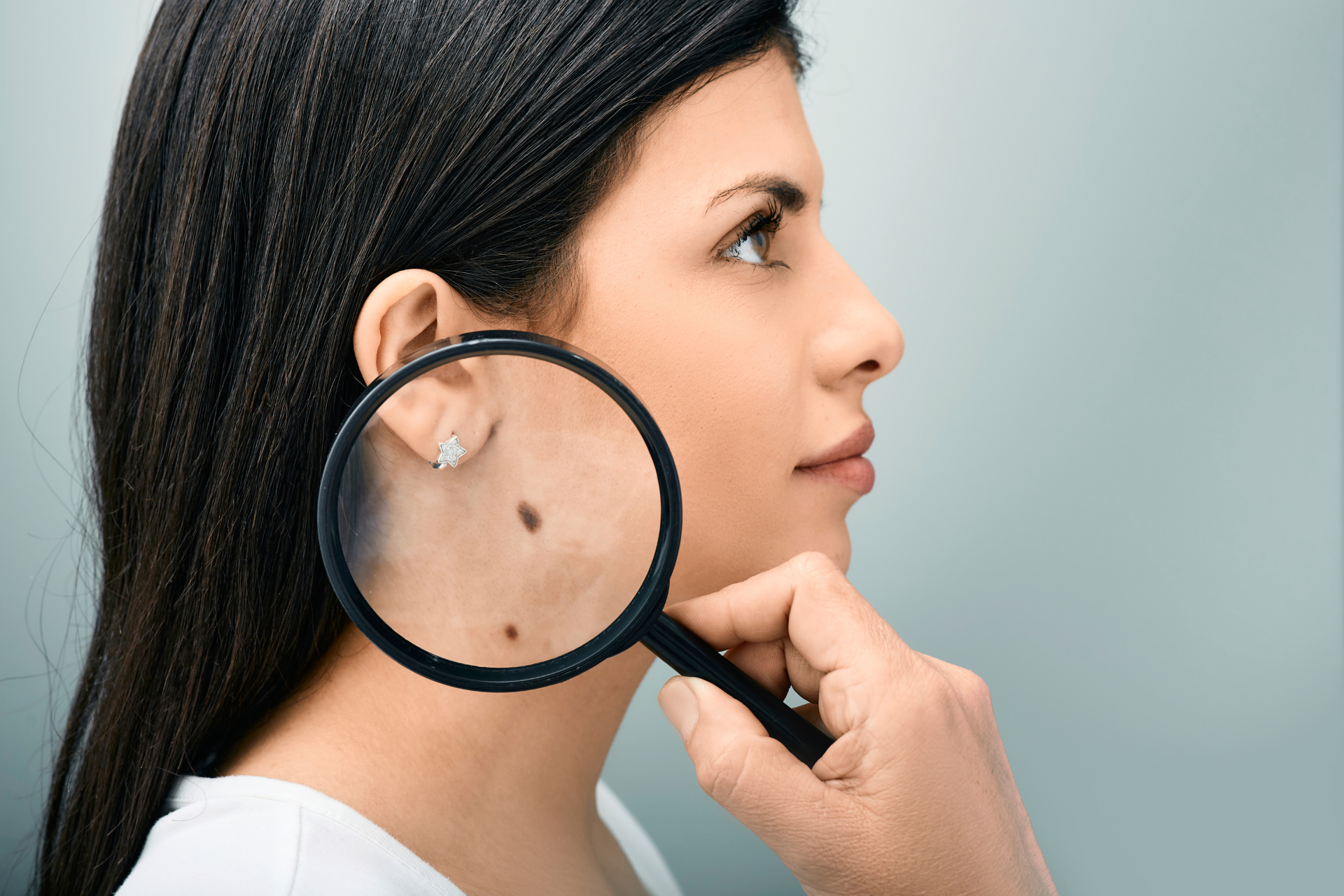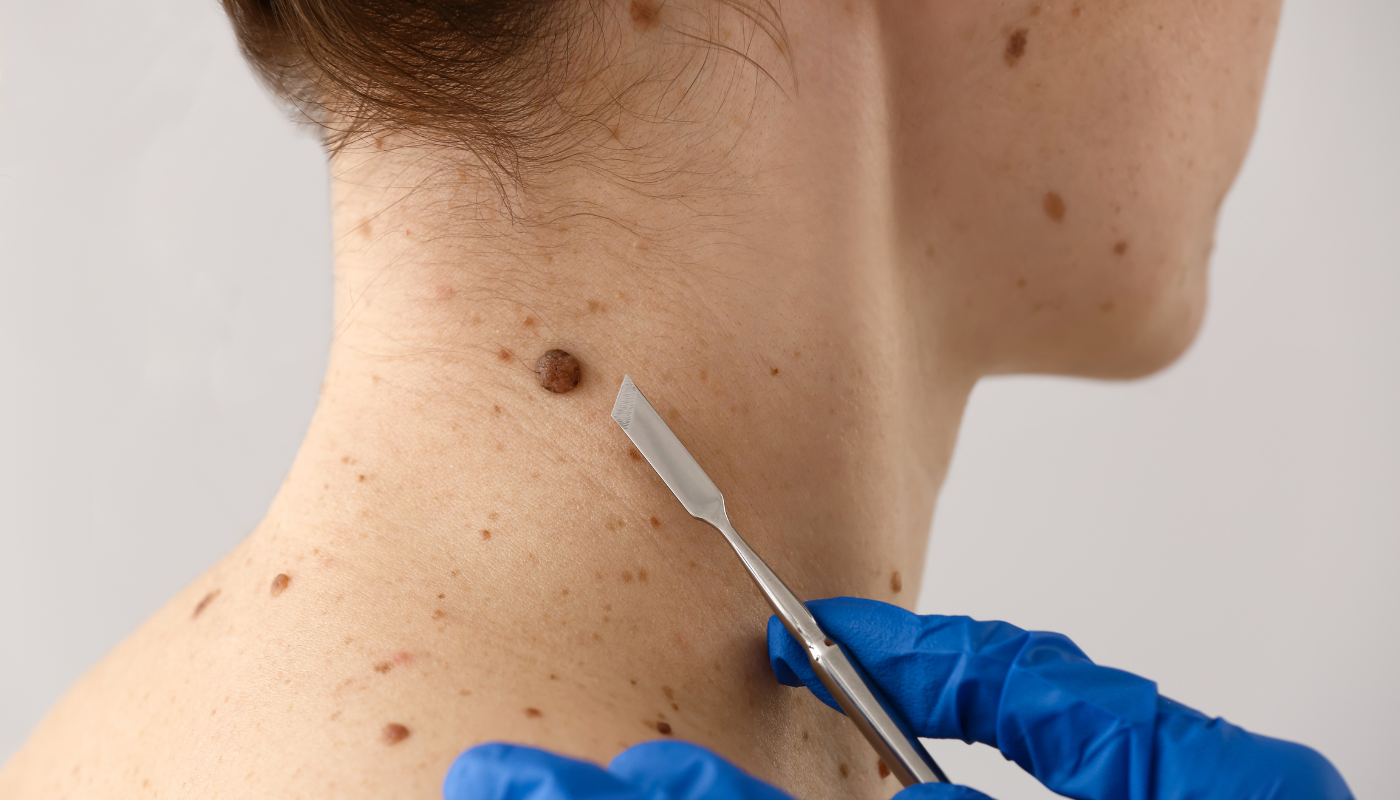The Role of Genetics in Canine Skin Cancer
Your Dog's Genetics and their risk of Skin Cancer.

Canine skin cancer is a major health concern for dog owners, with genetics playing a pivotal role in the susceptibility of certain breeds.
Let's explore how genetic factors influence the development of skin cancer in dogs, the types of cancers most affected by genetics, and the implications for dog owners.
Understanding Canine Skin Cancer
Skin cancer in dogs is a prevalent issue, with melanoma, squamous cell carcinoma (SCC), and mast cell tumours (MCTs) being among the most common types encountered by veterinarians.
These cancers can appear anywhere on a dog's skin and vary widely in their behavior, from slow-growing, benign tumours that may not require aggressive treatment to highly malignant ones that can spread rapidly and pose significant health risks. The approach to treatment and the prognosis for each dog will depend on the type of cancer, its location, the stage at diagnosis, and the dog's overall health, among other factors.
Melanoma
Melanoma in dogs typically affects the mouth or skin, especially areas with dark pigmentation. While cutaneous melanoma, which appears on the skin, is often benign, oral melanoma tends to be aggressive and has a high risk of spreading to other parts of the body (metastasis). Early detection and treatment, often involving surgery and possibly radiation therapy or chemotherapy, are crucial for managing this type of cancer.
Squamous Cell Carcinoma
SCC is a type of skin cancer that originates in the squamous cells, which make up most of the skin's upper layers. In dogs, SCC can occur on the skin, in the nail beds, and inside the mouth. Sun exposure is a risk factor, especially in dogs with lightly pigmented skin and thin coats. The treatment may involve surgical removal of the tumour, and in some cases, radiation therapy or chemotherapy may be recommended. The prognosis depends on the location of the tumor and how early it is diagnosed and treated.
Mast Cell Tumours
MCTs are the most common skin tumours in dogs and can range from very benign to highly malignant. These tumours arise from mast cells, which are part of the immune system. The appearance of MCTs can vary greatly, and they can occur anywhere on the body. Treatment options include surgical removal, which can be curative for many localised tumours. More aggressive MCTs may require additional treatments, such as chemotherapy or targeted therapy. The prognosis for MCTs depends on various factors, including the tumour's grade (a measure of how aggressive it is), size, and location, as well as whether it has spread.
Genetic Factors
Genetics can play a significant role in a dog's susceptibility to skin cancer. Certain breeds are more prone to specific types of skin cancer; for example, Greyhounds and Boxers have a higher incidence of MCTs, while SCC is more common in dogs with short, white coats that spend a lot of time in the sun.
Understanding these genetic predispositions can help in early detection and prevention strategies.
Prevention and Early Detection
Preventive measures, such as limiting sun exposure for dogs at risk of SCC and regular veterinary check-ups, can help catch skin cancer in its early stages when it is most treatable. For all dogs, regular skin examinations by the pet owner can aid in early detection. Any new lumps, bumps, or changes in existing skin lesions should be evaluated by a veterinarian as soon as possible.
The Importance of Veterinary Care
A veterinarian can assess skin tumours and may recommend a biopsy to determine the type of tumor and the most appropriate course of treatment. Advanced imaging techniques may be used to check for metastasis in aggressive cancers. The approach to treatment will vary based on the individual case but may include surgical removal of the tumour, radiation therapy, chemotherapy, immunotherapy, or a combination of these methods.
Skin cancer in dogs encompasses a range of conditions that can have very different prognoses and treatment options. Genetics, breed, and environmental factors can influence the risk of developing skin cancer. Early detection and prompt veterinary care are critical components of managing these diseases effectively, offering the best chance for a positive outcome.
The Genetic Link
The link between genetics and the predisposition of certain dog breeds to specific types of skin cancer underscores the complex interplay between a dog's genetic makeup and its health outcomes.
The genetic predisposition to skin cancers like melanoma, squamous cell carcinoma (SCC), and mast cell tumors (MCTs) in certain breeds indicates that hereditary factors, possibly specific genes or genetic mutations, play a crucial role in the development of these diseases.
This relationship provides a vital avenue for research, potentially leading to better prevention, early detection, and treatment strategies tailored to at-risk breeds.
Melanoma and Genetics
Melanoma is more commonly seen in breeds with dark pigmentation, such as Doberman Pinschers and Scottish Terriers. This suggests a genetic component related to pigment-producing cells that may increase the risk of developing melanoma. Research into the genetics of melanoma in dogs may reveal specific mutations or genetic markers that contribute to the disease's development, offering insights into both canine and human melanomas, given the biological similarities.
Squamous Cell Carcinoma and Genetic Predisposition
SCC's prevalence in breeds with short, fine coats or lightly pigmented skin, such as Boxers and White Bulldogs, points to a genetic vulnerability influenced by skin pigmentation and the protective qualities of the coat. These breeds may lack certain genetic factors that provide protection against UV radiation, making them more susceptible to skin damage and, subsequently, SCC. Understanding the genetic basis for this susceptibility could lead to recommendations for preventive measures tailored to these breeds, such as limiting sun exposure or using sun protection.
Mast Cell Tumors and Breed-Specific Risks
The frequent occurrence of MCTs in certain breeds, including Boxers, Boston Terriers, and Labrador Retrievers, suggests a strong genetic component. Research has identified specific genetic mutations associated with an increased risk of MCTs in some breeds, which could serve as markers for susceptibility. Identifying these genetic markers can improve screening and early detection efforts, allowing for prompt and targeted treatment approaches.
Implications for Breeding and Healthcare
The understanding that specific breeds are genetically predisposed to certain types of skin cancer has significant implications for breeding practices and veterinary care:
- Breeding Practices: Breeders can use genetic testing to identify carriers of genes associated with an increased risk of skin cancer, making informed breeding decisions to reduce the incidence of these cancers in future generations.
- Veterinary Screening and Prevention: For at-risk breeds, veterinarians can recommend regular screening for early signs of skin cancer and advise on preventive measures, such as avoiding excessive sun exposure or using protective clothing.
- Personalized Treatment: Knowledge of the genetic basis for skin cancers in dogs can lead to more personalized treatment strategies, leveraging targeted therapies that address the specific genetic mutations involved in a dog's cancer.
Future Research Directions
Ongoing research into the genetic underpinnings of skin cancer in dogs is essential for developing more effective prevention, detection, and treatment strategies. This research not only benefits canine health but may also provide insights into skin cancer in humans, given the shared genetic and biological pathways in cancer development across species.
In conclusion, the genetic predisposition of certain dog breeds to specific types of skin cancer highlights the need for breed-specific health monitoring and care strategies. It also underscores the importance of genetic research in understanding and combating these diseases, with the potential for improving health outcomes for both dogs and humans.

Genetics and Cancer Aggressiveness
Not only can genetics determine the likelihood of developing cancer, but they may also influence the aggressiveness of the disease. For instance, certain genetic markers have been identified that correlate with a higher grade of tumor and a more aggressive cancer course.
Genetic Research in Canine Skin Cancer
Ongoing research continues to uncover specific genetic mutations and markers linked to skin cancer in dogs.
These discoveries are crucial for several reasons:
- Early Detection: Identifying genetic markers can aid in the early detection of cancer, even before clinical symptoms appear.
- Targeted Treatments: Understanding the genetic basis of these cancers can lead to more effective, targeted treatments.
- Breed-Specific Health Strategies: Knowledge of genetic predispositions can inform breeding decisions to reduce the incidence of these cancers in future generations.
Implications for Dog Owners
For owners of breeds predisposed to skin cancer, this information underscores the importance of regular veterinary check-ups and being vigilant for early signs of skin cancer.
Additionally, understanding the genetic risks can help in making informed decisions about their dog’s health care and lifestyle.
Genetic Testing and Prevention
Genetic testing for cancer predisposition is an emerging tool in veterinary medicine.
While not yet widely available for all types of cancers, it offers a promising avenue for early detection and preventative care in at-risk breeds.
Dog Breeding Practices and Their Impact on Genetic Diseases
The practice of dog breeding has a profound impact on the genetic health of canine populations.
While breeding can be done responsibly to maintain or improve the health and traits of different breeds, certain practices can inadvertently lead to an increase in genetic diseases. Studies show a relationship between dog breeding practices and the prevalence of genetic diseases in dogs.
The Nature of Dog Breeding
Dog breeding has been practiced for centuries, initially focused on developing breeds for specific work roles, such as hunting, herding, or guarding. Over time, breeding has increasingly emphasised physical appearance and breed standards, sometimes at the cost of health.
The Impact of Selective Breeding
Selective breeding, when done without consideration for genetic diversity, can have negative consequences. Breeding dogs with specific desirable traits can also mean passing on genes associated with health issues. This is particularly evident in:
- Purebred Dogs: Inbreeding (breeding between closely related individuals) is common in purebred populations to maintain breed standards. This reduces genetic diversity and can increase the prevalence of inherited diseases.
- Designer Breeds: Breeding for specific traits in designer dogs (like Poodles crossed with other breeds for hypoallergenic fur) can unintentionally propagate genetic disorders if not managed carefully.

Common Genetic Diseases Due to Breeding Practices
Certain genetic diseases are prevalent in specific breeds due to breeding practices.
Examples include:
- Hip Dysplasia: Common in large breeds like German Shepherds and Labrador Retrievers.
- Brachycephalic Syndrome: In flat-faced breeds like Bulldogs and Pugs, leading to respiratory problems.
- Cardiomyopathies: Prevalent in Doberman Pinschers and Boxers.
- Hereditary Cancers: Like mast cell tumors in Boxers and Golden Retrievers.
The Role of Genetic Testing
Advancements in genetic testing have allowed breeders to identify carriers of certain genetic diseases. Responsible breeders use these tests to make informed breeding decisions, reducing the incidence of these diseases in future generations.
Ethical Considerations
The ethics of dog breeding practices have come under scrutiny, particularly regarding the prioritisation of physical attributes over health.
There's a growing call for a balanced approach that values the health and well-being of the dogs alongside maintaining breed standards.
Strategies for Healthier Breeding Practices
- Promoting Genetic Diversity: Encouraging outcrossing (breeding with unrelated individuals) can increase genetic diversity and reduce disease prevalence.
- Pre-Breeding Health Screening: Conducting thorough health screenings and genetic testing before breeding.
- Educating Breeders and Buyers: Raising awareness about the importance of responsible breeding practices and the impact of genetics on dog health.
The Future of Dog Breeding
There's a shift towards more responsible breeding practices, with an emphasis on health and temperament alongside physical traits.
Breed clubs and kennel clubs are increasingly acknowledging the importance of genetic health and are incorporating genetic testing into their breeding recommendations.
The practices employed in dog breeding significantly influence the genetic health of dogs.
While the goal of maintaining breed standards is understandable, it's crucial to balance this with the health and well-being of the animals. Responsible breeding practices, informed by genetic testing and a commitment to the overall health of the breed, are essential for the future of dog breeding.
As awareness grows and technology advances, there is hope for a future where dogs are not only bred for their appearance and abilities but also for their health and longevity.
The role of genetics in canine skin cancer is a complex but vital area of study.
It holds the key to understanding why certain breeds are more susceptible, how the disease progresses, and how it can be effectively treated or even prevented.
For dog owners, this knowledge emphasises the need for breed-specific care and vigilance. As research progresses, the hope is to utilise genetic insights to improve the health and well-being of our canine companions.
More Skin Tips.
CoreBodi












